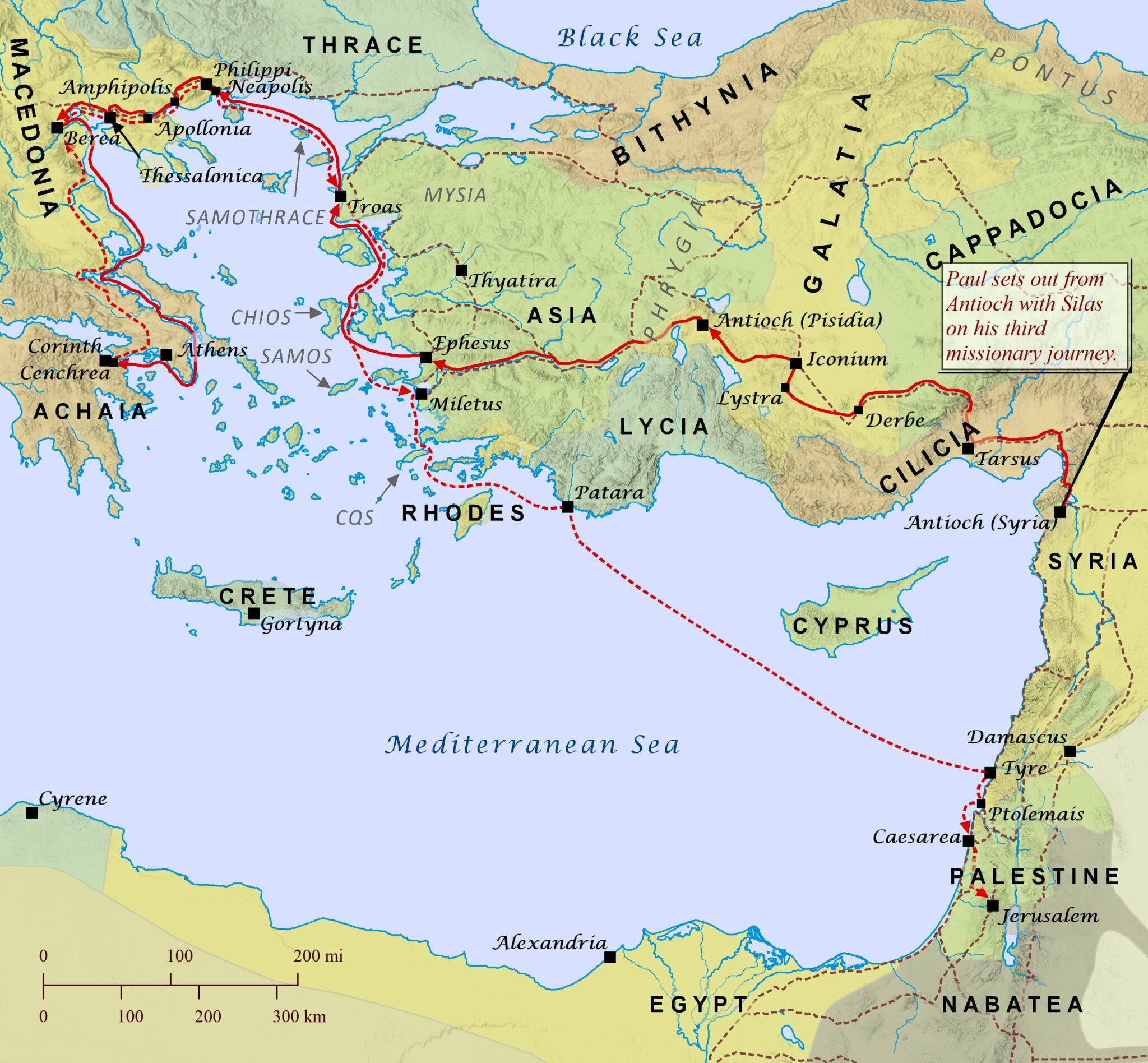Through faith in Jesus we can bear fruit for God. But if we remain devoted to follow the law and not our faith in Christ, we will continue to follow our sinful desires which the law brings out in us.
Paul continues the analogy of the widow being freed from the law’s requirement of being loyal to her husband once he has died. In like manner, Paul has argued, believers who have been placed into Christ’s death are freed from the requirements of the law of Moses. Paul carries the analogy another step, saying that our death in Christ frees us to “remarry,” in a spiritual sense. Our remarriage is to Christ, through our new membership in the Body of Christ:
Therefore, my brethren, you also were made to die to the Law through the body of Christ, so that you might be joined to another, to Him who was raised from the dead, in order that we might bear fruit for God (v 4).
The result of being “remarried” is that we should have a new kind of life, one that is fruitful, productive, and meaningful. Rather than use our freedom from the law to sink into sin, and reap loss and destruction, we have the great opportunity to live a purposeful life of great fruitfulness.
In the same way that the woman whose husband is dead is no longer tied to her marriage vow, so believers also were made to die to the Law through the body of Christ (v 4) because they have been baptized into Jesus’s death. Verse 4 makes this clear by saying that believers, through faith in Jesus, are dead to (or separated from) the law.
Paul is using the word die in the phrase made to die to the Law as we currently might use it, in the sense that “die” requires context to understand “what has been separated from what.” For instance, we could say that a relationship is dead, which would mean that the two people have separated in their fellowship with one another. Paul is using die (v 4) in the same way. Believers have been separated from the law (through faith on Jesus) so that they might be joined to another, to Him who was raised from the dead, Jesus.
In modern usage we might use the word die to refer to a battery: “The battery is dead.” This means the battery’s circuits are disconnected, another type of separation. In the same way, believers in Jesus have been disconnected from the power of the law, and now can be connected to a new power source—the gospel power of the resurrection of Jesus.
At the end of verse 4, Paul tells us that through faith in Jesus we can now bear fruit for God through the resurrection power of Jesus. Just as believers in Jesus are buried into the death of Jesus, so are we raised to new life in Him. In this way, we spiritually participate, by faith, in Jesus’s death and resurrection. The subsequent bearing of fruit for God then means doing God’s will through walking in the resurrection power of faith. To bear fruit means to accomplish something meaningful, purposeful.
God created humans to do good in the world. His original command to Adam included telling him to be fruitful (Genesis 1:28). He has promised to greatly reward His servants who are willing to be good stewards and bless others through love and service (Matthew 25:21; Revelation 3:21).
Paul is now overturning the argument of his opponents by exposing an underlying assumption embedded in their claim; they are presupposing that living in sin is a superior lifestyle, “If we can get away with sin, then we ought to do it.” Paul has confirmed that he does, in fact, teach that God’s grace covers all sin, and we cannot out-sin His grace. However, Paul is adamantly denying that this reality means we ought to sin. Rather, Paul asserts we ought NOT to sin, because sin leads to:
- Having our bodies dishonored (Romans 1:24)
- Addictions (Romans 1:26)
- Loss of mental health (Romans 1:28)
- God’s wrath and indignation at the Judgment (Romans 2:8-9)
- Judgement (Romans 2:12)
- Slavery to sin (Romans 6:16)
- Death (Romans 6:23)
We are still God’s children if we sin (2 Timothy 2:13). But if we choose a perspective that is real and true, we will see that our basic choice is whether to walk in the newness of life, and enjoy the experience of life, or go back into our old ways that lead to an experience of death.
This choice of life and death is the same basic choice that has been placed before humanity from the very beginning:
- God offered His creation, Adam, the choice of life versus death through one law, concerning the tree of knowledge, whether they would trust God or defy God (Genesis 2:17)
- God (through Moses) offered His people, Israel, the choice of life versus death through whether they would gain the blessing of a self-governing nation who love one another through trusting God, or a nation of exploiters who cause the nation to descend into darkness and violence (Deuteronomy 30:19).
Now Paul frames the choice for believers also as life or death—referring to our experience of life. We have been freed from sin, meaning we are now free to choose to walk apart from the power of sin. Paul exhorts us then to choose to walk in obedience to Jesus, following the Spirit, because that leads us to the fullest experiences of life. When we serve and love others, we create community, benefit, and harmony (Galatians 5:13-14, 22-25, 6:8a).
Our alternative is to walk in the flesh, which leads to an experience of death (Galatians 6:8b). When we sow to the spirit, we create division and disunity, pitting people against one another (Galatians 5:15).
In verse 5, Paul shows us while we were in the flesh, the members of our bodies (including our human appetites and sinful passions) were aroused — or awakened — by the law. As humans, when we are told what not to do, there is a part of our flesh that wants to break that rule.
This desire to break rules aroused by the Law agitates our flesh. Meanwhile, our flesh is at work in the members of our body to bear fruit (consequences) for death (v 5). Paul is talking about this desire we have, which encourages us to disobey the law, which reflects God’s (good) design. If we are separated from God’s (good) design, then we cannot be fulfilled in our design. Jesus’s sacrifice, however, allows us to be separated from the Law (death to the Law) and the desires that it brings up, so that we can be joined with Him to do God’s will. In this way, we then fulfill the Law, without being under the Law (Romans 8:4).
In doing God’s will, we can bear the fruit that leads to an experience of life. But when we are under the Law, we inevitably break the Law’s rules, and bear fruit for death (v 5). If we adopt the perspective of Paul’s opponents, Paul’s teaching of God’s grace leads them to say, “Yahoo, since we are under grace then we get to sin all we want to, which is a better life!” Paul’s counter is “You are mistaken, because choosing to live in sin leads to death, loss, addiction, and disconnection—it is choosing self-destruction.”
Biblical Text
4 Therefore, my brethren, you also were made to die to the Law through the body of Christ, so that you might be joined to another, to Him who was raised from the dead, in order that we might bear fruit for God. 5 For while we were in the flesh, the sinful passions, which were aroused by the Law, were at work in the members of our body to bear fruit for death.
Check out our other commentaries:
-
Deuteronomy 12:1-3 meaning
Moses commands the Israelites to utterly destroy all the religious sites where the Canaanites serve their gods. He commands them to cut down the engraved...... -
Genesis 3:16-19 meaning
God then judges Adam and Eve for their sin....... -
Genesis 4:6-10 meaning
God tries to counsel Cain, warning him of giving into sin and tells him to master it. Cain gave into jealousy and sin, he killed...... -
Genesis 10:30-32 meaning
Shem had twenty-six descendants listed in the table of nations. A total of seventy nations were credited to Noah by his descendants. ...... -
Son of Man meaning
Jesus often used the phrase Son of Man to reference Himself. In total, the four gospels will use the term Son of Man eighty-four times.......



